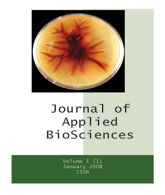Journal of Applied Biosciences (J. Appl. Biosci.) [ISSN 1997 - 5902]
Volume 36: 2360 - 2366. Published December 7, 2010.
Genotypic variation for acid stress tolerance in soybean in the humid rain forest acid soil of south Eastern Nigeria
Ojo, G. O. S.1*, L. L. Bello2 and M. O. Adeyemo1
1Department of Crop Production, University of Agriculture, P.M.B. 2373, Makurdi, Nigeria.
2Department of Plant Breeding and Seed Science, University of Agriculture, P.M.B. 2373, Makurdi, Nigeria.
ABSTRACT
Objective: To identify acid tolerant genotypes of soybean adapted to acid soils of Nigeria.
Methodology and results: A field experiment was conducted on the acid soil of the National Root Crops Research Institute, Umudike, Nigeria, in 2003 and 2004. The experimental design was a randomized complete block (with 55 soybean genotypes as treatments) and 3 replications. Data were combined before analysis due to non-significant genotype x year effect for all the traits. Highly significant differences in genotypic effects were observed for all the traits (days to 50% flowering, plant height at maturity, number of pods/plant, 100-seed weight and grain yield).
Conclusion and application of findings: The result identified eight acid tolerant varieties (Conqvista, TGX 1896-3F, TGX 1897-17F, TGX 1866-7F, TGX 1805-31F, Milena, Doko and TGX 1844-18E) with a higher grain yield of >1.80tons/ha compared to <1.45tons/ha in the previously recommended varieties (TGX 1485-1D and TGX 1440-1E). The result also showed the potential of the EMBRAPA genotypes in upgrading the TGX varieties for higher productivity. The eight identified acid tolerant varieties could therefore be explored in the development of improved high yielding soybean genotypes for production on acid soils of Nigeria.
Key words: Acid stress tolerance, soybean, genotypes, adaptation.
FULL PAPER [PDF AVAILABLE HERE]
